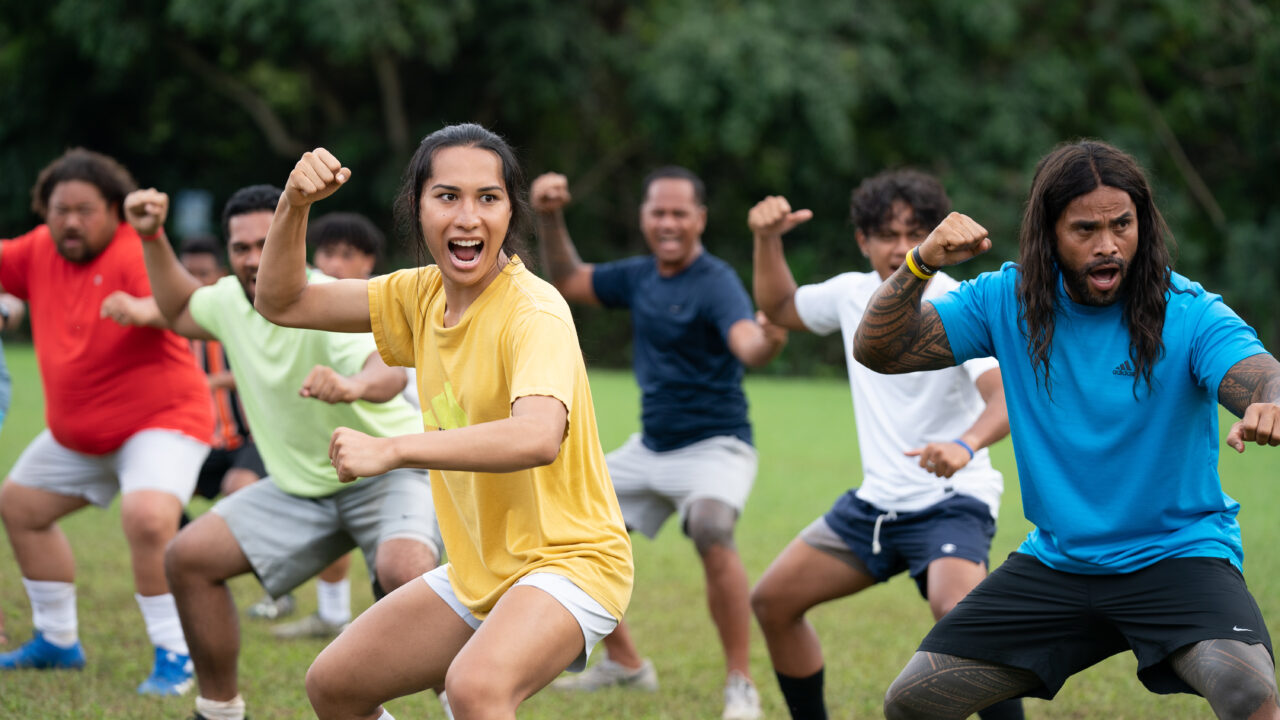Polynesian Happiness on the Soccer Field of Dreams
"Next Goal Wins" is part of a global racial and cultural reckoning in ethnic representation in cinema. Scene from "Next Goal Wins," coming out November 17, 2023. (Photo: Searchlight Pictures)
Scene from "Next Goal Wins," coming out November 17, 2023. (Photo: Searchlight Pictures)
Film fans are familiar with sports pictures about down on their luck coaches who redeem themselves by turning around losing teams and making these underdogs competitive. “Hoosiers” is a case in point, with Gene Hackman as a coach with a past and Dennis Hopper as the town drunk who sobers up to become assistant coach, together guiding their players to the state basketball championship. Co-writer/director Taika Waititi’s “Next Goal Wins” is in this tried-and-true tradition of ballgame movies — but with huge differences.
Waititi’s “Goal” is a comedy, not a drama; it has an extremely strong transexual athlete angle; and instead of Indiana, this work by the first Polynesian to win an Academy Award for screenwriting is set in American Samoa, which is located 2,500 miles south of Hawaii and has been a U.S. territory since 1900. Margaret Mead did her anthropological field work there in the 1920s, which resulted in her groundbreaking book “Coming of Age in Samoa.” Less famously, American Samoa was home of FIFA’s worst soccer team, which humiliatingly lost 31-0 to Australia in 2001. (“Next Goal Wins” is inspired by a true story and adapts a 2014 British documentary of the same name by Mike Brett and Steve Jamison, who are also producers of Waititi’s feature version.) As the World Cup qualifiers nears, the desperate head of the American Samoa Football Federation, Tavita (Oscar Kightley, who played inWaititi’s charming 2016 “Hunt for the Wilderpeople” and Disney’s 2016 “Moana”), seeks an experienced off-island coach — not to make the players champions, but, more humbly, so the disorganized sportsmen can score at least one goal on the field.
After he’s been fired by several soccer teams for his angry antics and outbursts, Dutch-American coach Thomas Rongen (two-time Oscar nominee Michael Fassbender) has a choice: unemployment or training American Samoa’s challenged team.
“Fa’afafine in American Samoan culture are people who have fluid genders that move between male and female worlds, showing two spirits in one person that coexist.”
Rongen reluctantly flies to the South Seas to helm the not-ready-for-prime-time-players. “Goal” is a classic fish-out-of-water story, with the high-strung coach confronted by happy-go-lucky footballers imbued with their faifai lemu (take it easy) ethos and extended family-oriented Pacific Islander communal customs. Rongen, the palagi (Caucasian), is simply astonished that training comes to a complete halt during the daily sa — a period of religious reflection and meditation enforced in this society where chiefs, clergymen (one of whom is comically portrayed by Waititi) and missionaries still hold sway. Likewise, Rongen is flabbergasted that nobody plays sports on Sundays, which is set aside for church, making him doubt that his Samoan athletes are serious about winning.
The final straw is after Jaiyah (Kaimana), the team’s longhaired striker, repeatedly disregards his instructions and the fuming coach asks why the teammate even bothers to play. Jaiyah’s jaunty response is not to win, but rather because soccer is “fun.” While Rongen may be the movie’s protagonist, Jaiyah — who refuses to be called “Johnny” by the soccer skipper — is “Goal’s” most interesting and most complex character. It turns out that Jaiyah is a fa’afafine, Polynesia’s age-old so-called “third sex,” males who perform traditional female roles. As this is the 21st century, Jaiyah is in the process of transitioning, but because the striker is still technically of the gender the athlete was assigned at birth, the rules permit Jaiyah to continue on the field with all-male players.
According to press notes, “Fa’afafine in American Samoan culture are people who have fluid genders that move between male and female worlds, showing two spirits in one person that coexist.” Explains Waititi: “It is a sacred part of their culture, it is just accepted.” At a time when transgender competitors are under attack for participating in sports in the so-called “civilized” USA, with bathroom hysteria generated by right-wing culture warriors, Jaiyah’s teammates casually accept Jaiyah — who eventually becomes their captain — as one of the team. However, when the American Samoan footballers square off against others seeking to qualify for the World Cup, Jaiyah is cruelly taunted. The captain’s soccer comrades stand by Jaiyah, as does the coach, who puts his faith in the talented fa’afafine in a simple act of solidarity, unconcerned by issues of gender identity and preference.
In this cross-cultural comedy, as Rongen whips his wannabe champs into shape, the Polynesians likewise work their magic on the manic coach. The Amsterdam-born Rongen also learns much from his island hosts, in particular that winning isn’t everything, along with the value and virtue of happiness. When, early on, the coach, blowing his top, gripes that “it’s torture coaching this team!” Tavita tells the newcomer that if he’s not happy, he should leave American Samoa. “Unhappiness is a curse that I would not wish on anyone,” Tavita says with sage aplomb.
Later, when Rongen makes an attempt at a rabble-rousing locker room speech to rally the players to victory, someone quips that he should spare them the “Any Given Sunday” sermon, like that delivered by Al Pacino’s coach in the 1999 Oliver Stone football movie.
The beautiful “Goal” is in the tradition of South Seas Cinema, the film genre depicting Pacific Islanders and their islands, such as various versions of the “Mutiny on the Bounty” saga. Motion pictures began being made in the Pacific in 1898, when a Thomas Edison camera crew filmed actuality in Oahu (where “Goal” was also lensed on location). The genre’s first classic was likely Robert Flaherty’s 1926 documentary-like “Moana of the South Seas,” which was made next door to American Samoa in what is now the independent nation of Samoa (Disney probably derived the title for its 2016 animated feature “Moana” from Flaherty’s documentary-like production).
Instead of telling the story from the palagi perspective of dominant white majority filmmakers, we are now privy to the Indigenous point of view.
However, “Next Goal Wins” is part of a distinct development in South Seas Cinema. As Taika Waititi is part New Zealand Maori (part Jewish, too), the Native is literally flipping the script, writing the screenplay (along with co-writer Iain Morris) and working behind the camera, and instead of telling the story from the palagi perspective of dominant white majority filmmakers, we are now privy to the Indigenous point of view.
“Goal’s” attitudes towards gender, the meaning of life, the purpose of spirituality, the power of happiness, are very Polynesian. As such, it is part of the racial reckoning now sweeping the screen globally, injecting a much-needed Polynesian frame of mind into Hollywood discourse. In its final frames, this delightful movie perfectly captures and encapsulates the best of Polynesian culture when, in front of the team, the Samoan Tavita tells the palagi Rongen that he’ll always have a home on their island and that they love him. Viewers are likely to feel the same about the movie.
Your support matters…Independent journalism is under threat and overshadowed by heavily funded mainstream media.
You can help level the playing field. Become a member.
Your tax-deductible contribution keeps us digging beneath the headlines to give you thought-provoking, investigative reporting and analysis that unearths what's really happening- without compromise.
Give today to support our courageous, independent journalists.





You need to be a supporter to comment.
There are currently no responses to this article.
Be the first to respond.